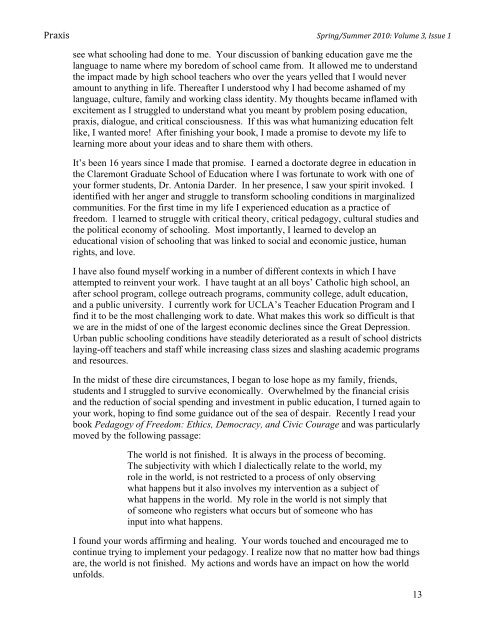PRAXIS - Paulo Freire Institute
PRAXIS - Paulo Freire Institute
PRAXIS - Paulo Freire Institute
- No tags were found...
Create successful ePaper yourself
Turn your PDF publications into a flip-book with our unique Google optimized e-Paper software.
Praxis Spring/Summer 2010: Volume 3, Issue 1<br />
see what schooling had done to me. Your discussion of banking education gave me the<br />
language to name where my boredom of school came from. It allowed me to understand<br />
the impact made by high school teachers who over the years yelled that I would never<br />
amount to anything in life. Thereafter I understood why I had become ashamed of my<br />
language, culture, family and working class identity. My thoughts became inflamed with<br />
excitement as I struggled to understand what you meant by problem posing education,<br />
praxis, dialogue, and critical consciousness. If this was what humanizing education felt<br />
like, I wanted more! After finishing your book, I made a promise to devote my life to<br />
learning more about your ideas and to share them with others.<br />
It’s been 16 years since I made that promise. I earned a doctorate degree in education in<br />
the Claremont Graduate School of Education where I was fortunate to work with one of<br />
your former students, Dr. Antonia Darder. In her presence, I saw your spirit invoked. I<br />
identified with her anger and struggle to transform schooling conditions in marginalized<br />
communities. For the first time in my life I experienced education as a practice of<br />
freedom. I learned to struggle with critical theory, critical pedagogy, cultural studies and<br />
the political economy of schooling. Most importantly, I learned to develop an<br />
educational vision of schooling that was linked to social and economic justice, human<br />
rights, and love.<br />
I have also found myself working in a number of different contexts in which I have<br />
attempted to reinvent your work. I have taught at an all boys’ Catholic high school, an<br />
after school program, college outreach programs, community college, adult education,<br />
and a public university. I currently work for UCLA’s Teacher Education Program and I<br />
find it to be the most challenging work to date. What makes this work so difficult is that<br />
we are in the midst of one of the largest economic declines since the Great Depression.<br />
Urban public schooling conditions have steadily deteriorated as a result of school districts<br />
laying-off teachers and staff while increasing class sizes and slashing academic programs<br />
and resources.<br />
In the midst of these dire circumstances, I began to lose hope as my family, friends,<br />
students and I struggled to survive economically. Overwhelmed by the financial crisis<br />
and the reduction of social spending and investment in public education, I turned again to<br />
your work, hoping to find some guidance out of the sea of despair. Recently I read your<br />
book Pedagogy of Freedom: Ethics, Democracy, and Civic Courage and was particularly<br />
moved by the following passage:<br />
The world is not finished. It is always in the process of becoming.<br />
The subjectivity with which I dialectically relate to the world, my<br />
role in the world, is not restricted to a process of only observing<br />
what happens but it also involves my intervention as a subject of<br />
what happens in the world. My role in the world is not simply that<br />
of someone who registers what occurs but of someone who has<br />
input into what happens.<br />
I found your words affirming and healing. Your words touched and encouraged me to<br />
continue trying to implement your pedagogy. I realize now that no matter how bad things<br />
are, the world is not finished. My actions and words have an impact on how the world<br />
unfolds.<br />
13


